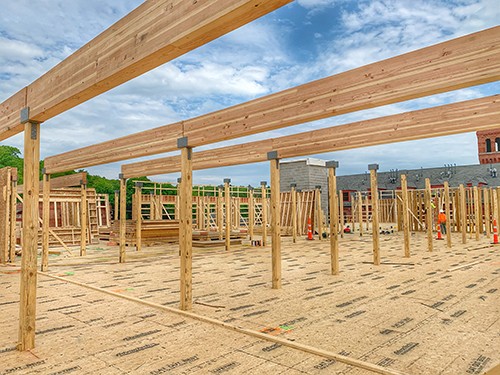- Who We Are
-
Our Work
-
Educational
- Brooks School- George and Evanthea Demoulas Family Boathouse
- Riverbend School - Gym and Schoolhouse
- Lesley University- Animation Studio
- Middlesex School- Bass Arts Pavilion and Danoff Visual Arts Center
- Nashoba Brooks School- Sureau Family Discovery Barn
- The Southport School- Arts and Music Building
- Senior Living
- Hospitality
-
Healthcare
- Partners Urgent Care
- Yale New Haven Health- Medical Office Building
- The Hospital of Central Connecticut - Advanced Wound and Hyperbaric Medicine Center
- Connecticut Children's - Infusion Center and Gastrointestinal Clinic
- Connecticut Children's - Specialty Care Center
- MidState Medical Center- Post-Anesthesia Care Unit Expansion & Renovation
- Commercial
- Specialty Work
-
Educational
- How We Do It
- Our Blog
- Industry Tidbits
- Join Our Family
- Contact Us
The Contractor Should Control the Builders Risk Policy. Here’s Why.
February 23rd, 2022
What is Builders Risk Insurance?
Builders Risk insurance is a first party contract that provides property insurance to the project as it’s being constructed. The policy can also include the existing structure in the event there’s a renovation project and the owner’s property insurance carrier is uncomfortable covering the existing building while it’s being renovated.
The construction project needs a Builders Risk Policy because General Liability Policies, which are a negligence-based policy and have several exclusions, do not provide adequate protection in the event of a loss.
What is Mutual Waiver of Subrogation and Why Is It Important?
The AIA contract has a Mutual Waiver of Subrogation built right into it. This is standardized language in the insurance industry. A Mutual Waiver of Subrogation takes the finger-pointing out of the formula in the event of a loss on the construction site. The General Liability Policy has several exclusions that can complicate who and what is covered in the event of a large property claim. With a Mutual Waiver of Subrogation, all the parties are protected, there’s no finger-pointing, the carrier of the property policy pays, and everyone can move on with the project.
Property policies allow a Mutual Waiver of Subrogation without approval from the insurance company. This is the only line of coverage that allows mutual waivers of subrogation without approval from the insurance company. However, there are some insurance companies where you have to advise them before executing a contract with one included.
Challenges When the Owner Holds the Builders Risk Policy 
Challenges occur when the Builders Risk policy isn’t robust enough for the risks on the project. The policy may have exclusions where either or both the Owner and Contractor aren’t properly protected. One example of this is when Owners put insurance specifications in their contract, and they don’t want to be responsible for material in transit or materials at temporary locations. Owners don’t want to pay a premium for this protection, even though many policies provide some automatic coverage for it. If the contract says the Owner’s not going to be responsible for materials in transit, then the insurance company will push back on the loss and say they’re not contractually responsible for covering it.
Another challenge is if the Owner buys the Builders Risk policy, they’re the one typically responsible for filing the claim and paying the deductible. An Owner may buy the policy with a high deductible, then try to shift the deductible to the contractor in the event of a loss on the jobsite. However, the way the contract is written, the owner is responsible for paying the deductible. They are also responsible for managing the claim and coordinating resources between the project and the insurance company.
Why the General Contractor Should Own the Builders Risk Policy
If the general contractor purchases and controls the Builders Risk Policy, their insurance agent can make sure the policy is written per the contract. Often times, the contract is specific in the types of perils to be covered. The general contractor normally wants to buy down the deductible as low as they can get it based on the type of construction being done, which determines the type of coverage the carrier will offer.
In contrast, when the Owner purchases the Builders Risk Policy, they’re typically doing so through an existing Property line, which traditionally has a high deductible. Because an Owner can purchase, what appears to be a reasonably priced Builders Risk through their property line, it may not cover all the perils, and traditionally has the same high deductible as their property line. In case of a loss, this won’t properly cover the risks on the construction project.
If the general contractor purchases the policy, and a loss does occur, the entire process is easier and smoother to handle from an Owner’s perspective. The Owner doesn’t have to file the claim or manage the claim; the contractor does that. Builders Risk Policies have set expectations and exclusions, and a general contractor with experience and the correct resources, like a seasoned Insurance Agent, will be able to navigate the depths of these policies. The contractor-controlled Builders Risk Policy reduces the Owner’s exposure and contention in the event of a loss, all while eliminating the added burden of the deductible.










